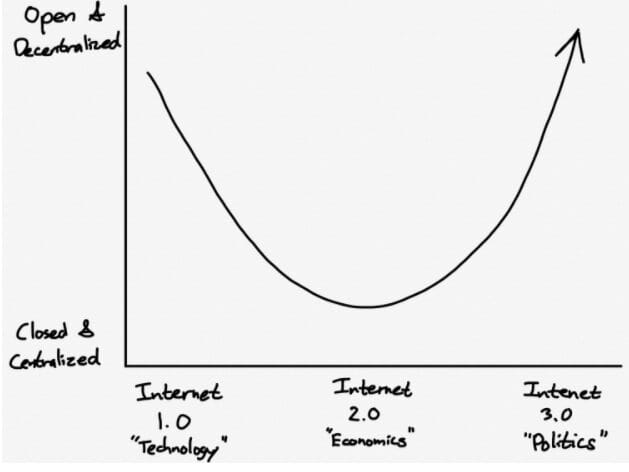- The Boomerang Letter
- Posts
- The Internet Blows Open 🪃
The Internet Blows Open 🪃
Decentralized Media
Short, practical drops on culture and technology. 🚀
Our community is growing! Start and end your week with what the builders are reading. 👇
The blowing open of the internet 🙏
Happy Monday! ☀️
If you're connected to media and tech in any way, you've read about the controversy around Spotify and Joe Rogan. For those of you not in this space, everyone from mainstream podcast hosts, to the mainstream media, to the US government, have called for Spotify to take action against 'misinformation.'
Interestingly, in much of the rhetoric is the word 'decentralization.' What does being dependant on a centralized platform ultimately mean? What would it look like if there was a decentralized media platform?
We're looking back in to the evolution of the internet to try and understand the moment.
Okay, let's get into it. 🚀
Tweet of the Day (TOD)! 🐦
I can't get enough of Pete Halvorsen. He's an amazing photographer and he's really carving out his place in the NFT landscape. Check out his collections! 🤟
Web1 👉 Web3 🌍

I spend a lot of my time considering the evolution of the web and how it impacts culture. In some ways, decentralization was a feature of the early web, not a bug. It was an open protocol that the world was plugging in to and building on top off.
There's an analogy here somewhere to Ben Thompson's awesome work on platforms vs. aggregators.
We've already put some dates and key-words around Web1 👉 Web3 that we don't need to revisit here, but the fact that the conception of the internet has analogies to the internet currently being built fascinates me.
Somewhere along the line, gate-keepers were created at the forefront of major Web2 communities. Platforms like Facebook and Twitter were free to the user, but their data was sold and leveraged on behalf of the few.
We could write your own work on major distribution platforms, but we were at the mercy of their content filters. Every company charts their own course and conceives of its own culture, as is their right. But many don't think this is a sustainable way to communicate at scale.
The question for many going forward is, is there a truly decentralized web coming where major distribution is possible without being at the mercy of the ethics or regulation of specific platforms on either side of the political isle?
What would decentralized media look like? 🤝
Perhaps we can crowdsource a list of the best decentralized content and crowdfunding tools as of Feb 2022. combines both, for example.
What else we got? Include links please.
— Balaji Srinivasan (@balajis)
11:13 PM • Feb 5, 2022
If we're going to consider what a decentralized media landscape would look like, let's ask some questions.
Would it be a true platform? Would the creators of the rails remain agnostic to content? They've created a distribution platform and then, in some way, it's set free.
How does it not devolve in to chaos? I'm a big fan of humans. But right now it's a dark time socially. We are the social media guinea pigs. It's so new. Some elements of a decentralized distribution platform frighten me. Maybe it's worth it?
How do we tune in to one another on a decentralized distribution platforms? Is it a traditional follow scheme? Do we all have to be producing work on the same one or will there be a protocol that links all decentralized media platforms, similar to how my ENS domain name travels across any ETH wallet.
How do we prevent even greater social segregation? Behaviour change is hard. Engaging ideas we disagree with is hard. It takes effort.
Thanks for reading. I hope you start building today. 🚀
Gratitude 🙏
I feel lucky to have you on the other end of this newsletter. If you haven't yet, join the community, and a bring a friend! Have a great week.👇
See you on the path.
- MG

